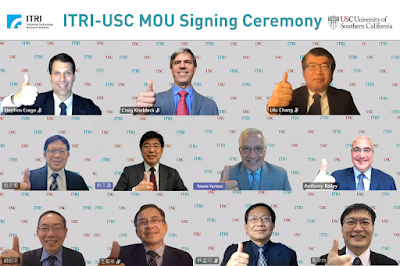The MOEA stressed that the cooperation will combine the strengths from ITRI and USC to drive advancements in the global semiconductor industry. USC’s Metal Oxide Semiconductor Implementation Service (The MOSIS Service) has long provided silicon prototyping and low volume production services and has been worked with global leading semiconductor foundries such as TSMC, while ITRI has been dedicated to developing advanced semiconductor technologies and assisting Taiwan’s semiconductor supply chain players to optimize and upgrade their products. It is expected that their joint work can connect key chip partners in the US and address the global trends in AI computing applications.
ITRI President Edwin Liu remarked that ITRI and USC signed a memorandum of cooperation in November, 2021 that focuses on chip design and development, IP authorization, shared wafer trial production, and next-generation semiconductor R&D. With the official announcement of the collaboration with USC, he expressed his excitement to see how the partnership will bring new opportunities, using ITRI’s multidisciplinary R&D platforms and MOSIS’ prototyping capacities. “ITRI and USC will collaborate via an institution-to-institution mechanism and build a customer service business model that provides Taiwan’s companies with chip packaging and related downstream services following trial production,” he said.
“We are excited that the research teams at USC’s Electrical and Computer Engineering Department (ECE) and Information Sciences Institute (ISI) with strong profiles in artificial intelligence, radio-frequency and millimeter-wave IC designs, analog and mixed-signal circuits, quantum computing, and optoelectronics can extend their global collaborations with ITRI’s outstanding teams. We look forward to seeing the R&D coworking that advance the microelectronic technologies going into applications of great innovations,” said Dr. Yannis Yortsos, Dean of USC Viterbi School of Engineering.
Dr. Anthony Bailey, USC Vice President for Strategic and Global Initiatives, remarked that the joint efforts between USC and ITRI laid out a new arena of USC’s global research and development, being a marriage of USC’s first-tier, fundamental electronic and optoelectronic research record and capabilities and ITRI’s research and development with a unique focus on industry application and commercialization.
Dr. Craig Knoblock, Executive Director of USC ISI, added that The MOSIS Service has the leading-edge capabilities to support semiconductor design and manufacturing, and looked forward to seeing the fruition of semiconductor projects that will benefit innovative start-up companies in the US and Taiwan.
ITRI is committed to promoting technological innovation to assist in industrial upgrading and transformation. In its 2030 Technology Strategy and Roadmap, ITRI is strengthening R&D in semiconductors and intelligentization enabling technology to support multiple applications in 5G, big data, IoT, and AI. It is hoped that the expertise of ITRI and USC will create a win-win situation for all parties and solidify the foundation for the next-generation semiconductor development.
